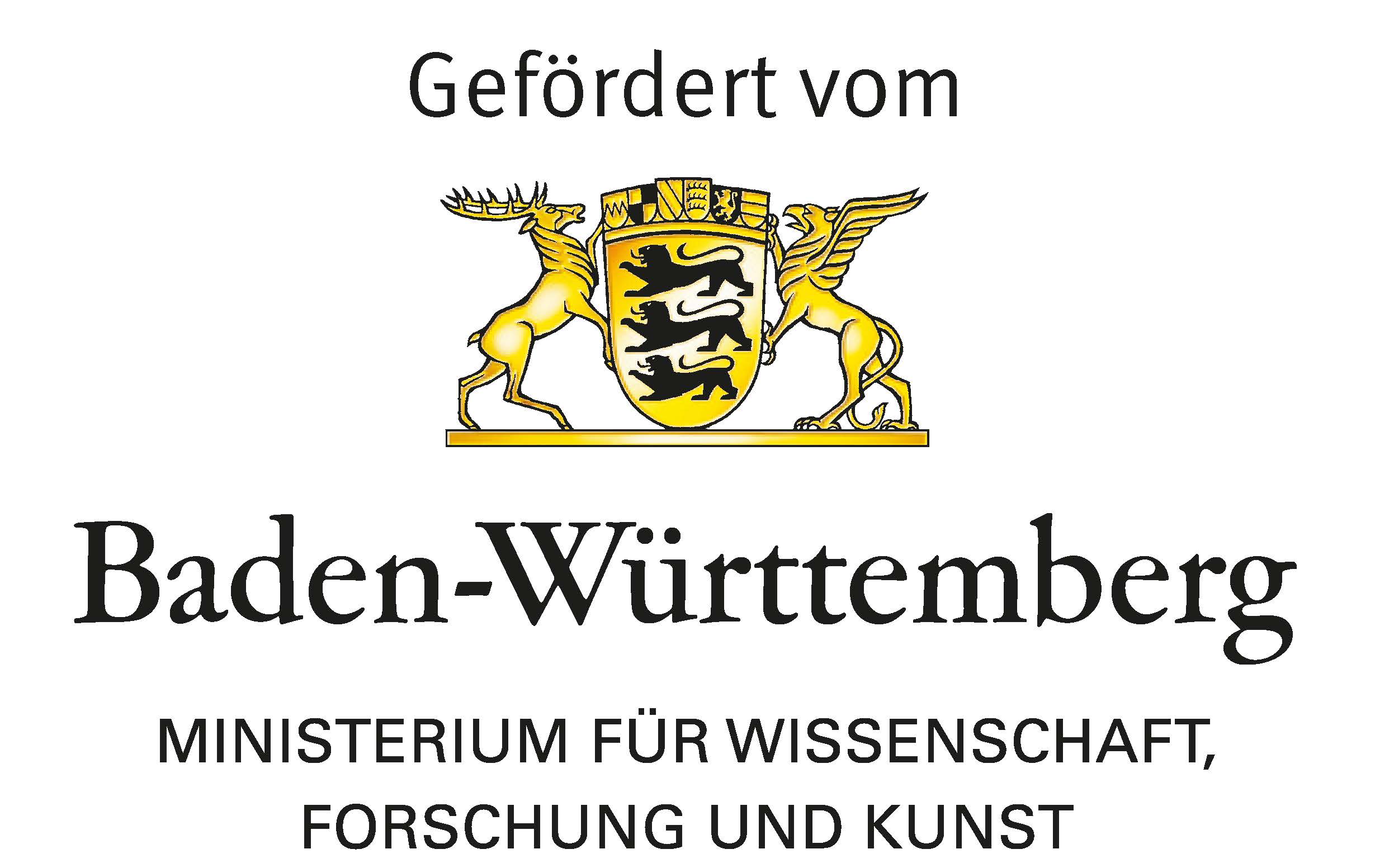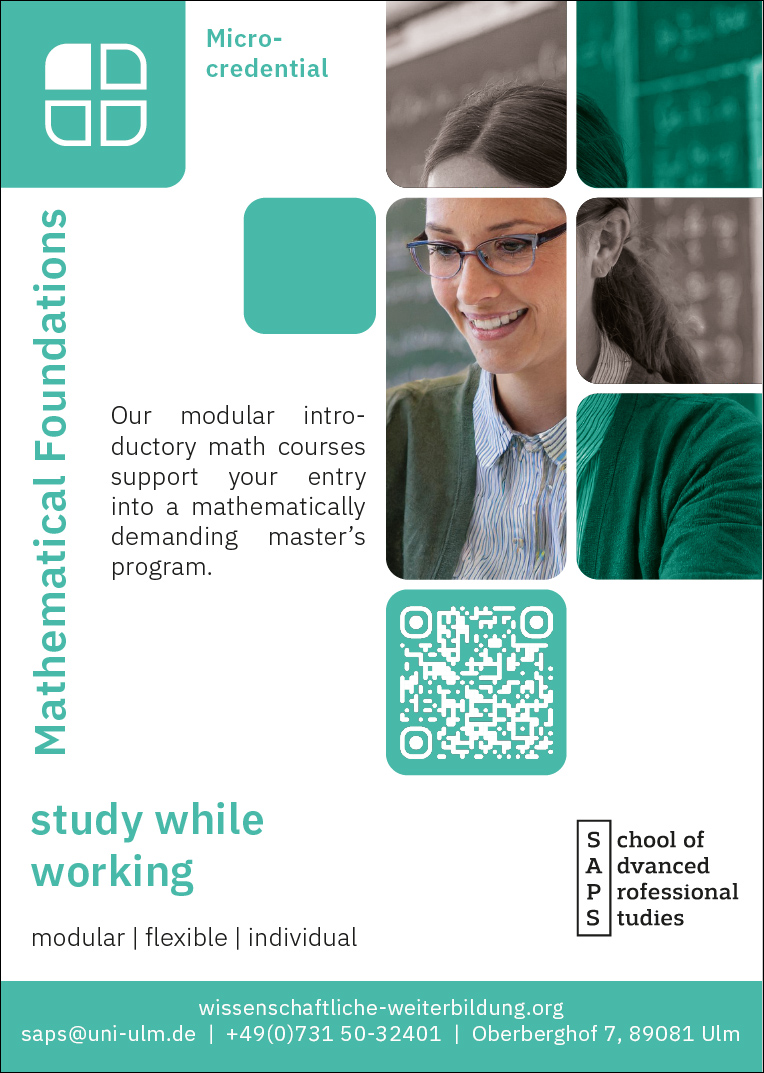Microcredential – Fundamentals of Mathematics
The introductory course “Fundamentals of Mathematics” provides students with basic knowledge of higher mathematics and is intended to facilitate the transition into part-time academic study or the switch from a university of applied sciences to a university. After completing the course, students will have an overview of the most important topics in analysis and linear algebra. In particular, they will have mastered elementary proof techniques and will be familiar with the basic concepts of set theory, vector spaces, and matrices. Additionally, they will understand key properties that characterize functions, especially continuity and differentiability. They will also have become familiar with the definitions of convergence for sequences and series and with the calculation of limits. Based on this introductory module, participants will be able to attend further, mathematically-oriented courses.
Schedule
Week 1: 15 Sept - 21 Sept 2025
- Elementary Proof Techniques
- Set Theory
Woche 2: 22 Sept - 28 Sept 2025
- Vector Spaces
- Online Seminar on Worksheets 1 and 2
Woche 3: 29 Sept - 05 Oct 2025
- Matrices
- Online Seminar on Worksheet 3
Woche 4: 06 Oct - 12 Oct 2025
- Sequences and Series
- Online Seminar on Worksheet 4
Woche 5: 13 Oct - 19 Oct 2025
- Functions
- Online Seminar on Worksheet 5
Flexible Date
- Online Seminar on Worksheet 6
In the first week of the course, a poll will be conducted on Moodle to determine the schedule for the synchronous online tutorials. These tutorials will then take place weekly from the second week onwards.
Fee: 180.00 euros
You can find the module handbook here.
- Elementary Proof Techniques:
Knowledge of elementary logic and basic techniques of mathematical proof is essential for understanding higher mathematics. Therefore, in the first chapter we will cover the basics of logic and elementary proof techniques, such as proof by contradiction and mathematical induction. - Set Theory:
In this section, we will review the basic concepts of set theory, starting with the definition of a set and continuing to common set operations. - Sequences and Series:
The concept of sequences is a cornerstone of analysis. In this chapter, we will first define the terms sequence, convergence of a sequence, and limit of a sequence, then summarize some fundamental results. In the second part, we will use the theory of sequences to introduce series. - Functions:
To begin this chapter, we will revisit the definition of a function and the concepts of injectivity and surjectivity. We will then examine other important characteristics of functions, particularly different forms of continuity and differentiability. - Vector Spaces:
This section is intended to move beyond the intuitive arrow-like idea of a vector. We will introduce the abstract concepts of a vector space, scalar product, and norm. Then we will look at key properties of vector space elements such as linear independence and the concept of a basis. - Foundations of Linear Algebra:
In the final chapter, we will focus on the special vector space of square matrices. We will begin with the definition of eigenvalues and eigenvectors and methods for computing them. We will then show how certain matrices can be transformed, using a change of basis, into diagonal matrices. These matrices are called diagonalizable. We will clarify under what conditions a matrix is diagonalizable.
To deepen the knowledge acquired in the fundamentals course, the following two additional courses are offered:
1. Specialization for CSE and Sensor Systems Engineering
- Differential Equations
- Taylor Expansion and Approximation
- Integral Calculus
- Integral Transformations
- Fundamentals of Probability
- Fundamentals of Statistics
- Self-study using the provided script
- Working through topic-based exercises
- Online tutorials to discuss content and exercises
- Final session for general Q&A
- Topical exchange in online forums
- Oral or written final examination
The certificate course materials are written in German and English. The language of instruction is German or English, depending on the language requirements of the participants.
Participants who pass the final exam will receive a certificate and a supplement describing the course content and the skills acquired. The exam is graded. The certificate documents 4 ECTS credits for the course "Fundamentals of Mathematics." Participants should plan for a total workload of approx. 120 hours, including self-study, mentoring, participation in the attendance day, and preparation and completion of the exam.
None
The Microcredential Fundamentals of Mathematics costs 180 €. It includes access to all provided learning materials for the duration of the course as well as participation in the associated in-person sessions.



